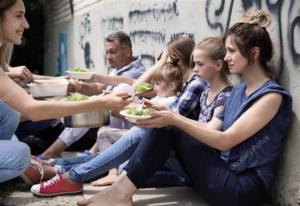Jesus took the loaves, gave thanks, and distributed them to those who were reclining, and also as much of the fish as they wanted (John 6:11).
For several years I took classes in Judaism at a local synagogue, occasionally attending services, especially on holy days. One Sukkot, I attended the congregational supper in the synagogue’s sukkah, the outdoor hut reminiscent of those used by the Israelites during their wandering in the desert that Jews use for meals during the seven-day holiday. The rabbi and his wife had invited me to sit at their table. I was seated next to the widow of the synagogue’s previous rabbi and we chatted amiably throughout the meal.
At one point, she asked me what I did for a living. This was a question I dreaded whenever I visited the synagogue. Out of respect for my hosts, I always did my best to be discreet about the fact that I worked as an apologist for Catholic Answers. I didn’t want congregants to wonder if I was there to proselytize them. The strategy I developed over time was to deflect the question.
“So, tell me, Michelle, what do you do for a living?”
“I work for a local nonprofit.”
This answer sometimes satisfied my questioners, especially if they were asking out of politeness and didn’t have a deep interest in the answer. Occasionally, though, someone would light up, wanting to know more. Perhaps because we were visiting over a meal, that’s what happened with the rabbi’s widow. She immediately wanted to know more.
“What do you do for this nonprofit?”
“I’m in customer service.”
This wasn’t precisely accurate, but I did answer calls from Catholic Answers’ constituents and provide them with assistance. I really didn’t want to explain what an apologist was and how exactly apologists “helped” people.
But my new friend kept pressing. Eventually, I ended up telling her the whole story. She wasn’t shocked or annoyed. Much to my surprise, she was fascinated. What exactly did Catholic Answers do?
I explained as best I could, still trying to play down the whole “defending the Catholic faith” and “lead[ing] non-Catholics into the fullness of the truth” aspect of Catholic Answers’ “mission.”
“I see,” she said in a thoughtful tone of voice, nodding. “And what do you do for the poor?”
Great question. What did we do for the poor?
I don’t remember now how I answered her. But the question stuck with me, popping up at odd times to remind me that I didn’t have a good answer for what Catholic Answers did that actually made a difference in people’s lives.
Yes, Catholic Answers donated materials to seminarians, to the military, and to prisoners. We could pull out letters from people grateful to have received a free subscription to the magazine or free booklets and tracts. Yes, we sometimes heard from people who told us that something they’d heard on the radio show or read on the web site had helped them better understand the Catholic faith.
But we were barely known in the Diocese of San Diego, where the apostolate is located. It became an inside joke that we’d have to repeat the apostolate’s name more than once in conversations because most people had never heard of it. One of my coworkers once told someone she worked for Catholic Answers and the response was “Catholic Dancers?”
Meanwhile, most people in San Diego have heard of Father Joe’s Villages, the downtown ministry to the homeless that was built from the ground up by the late Msgr. Joseph Carroll, an affable priest who became well-known to Catholics and non-Catholics alike as the face of outreach to the poor in San Diego. Generations of San Diegans watched him on television asking for support, inviting them to be “neighbors helping neighbors,” as he liked to say.
Father Joe, as he preferred to be called, died recently. The outpouring of reminiscences from people whose lives he changed has been flooding local media. I couldn’t help but compare this spontaneous show of love for a priest in my community—especially in a time of justifiable distrust for Catholic clergy as a whole—to the occasional emails and letters of thanks I saw during my years at Catholic Answers.
What then has more impact? What ultimately has more lasting importance? Telling people how to live their lives, or helping them access the resources they need to escape poverty and find hope?
Apologists might answer that teaching people about “the fullness of truth” points them to heaven. “Instructing the ignorant” is one of the spiritual works of mercy, and conservative Catholics tend to have a higher appreciation for the spiritual works than for the corporal works, such as feeding the hungry and clothing the naked. I’ve seen other priests sneer at the idea that Christians should focus on treating people kindly and offering them food. Why do you need to be Christian if that’s all Christianity is about, they ask.
But Jesus didn’t limit himself to instructing the ignorant. The most spectacular of his miracles, recounted in all four gospels, was his feeding of the masses from a few loaves of bread and a couple of fish. Alleviating hunger mattered. Sparing people a long walk back to where they might be able to find something to eat was important. The miracle was followed up by the promise of the Eucharist, Jesus’ promised food for the soul. And the Eucharist, it’s worth noting, wasn’t a lecture or an exhortation, but Christ’s gift of his own body and blood to strengthen souls.
The outpouring of gratitude for the miraculous meal was immediate. The crowds were in awe and thought that “This is truly the Prophet, the one who is to come into the world” (John 6:14). They wanted to make Jesus their king.
Being crowned an earthly king wasn’t Jesus’ goal, so he took off. But there’s something to be said for the instinct the crowd had to anoint Jesus as their chosen leader. They were overwhelmed by Jesus’ care for their needs, they wanted to express their gratitude that their needs were taken seriously. So, they tried to make him king, likely the highest form of honor they had available.
What do you do for the poor? Perhaps that’s a question that should be asked more often. Because in both this life and the next, we’ll be judged by how well or how poorly we serve our neighbors in need.
Michelle Arnold was a staff apologist for Catholic Answers, a Catholic apologetics apostolate in the Diocese of San Diego, California, from 2003–2020, answering questions from clients about the Catholic faith via phone, letter, email, and online platforms. She contributed essays to Catholic Answers’ online and print magazines, and wrote four booklets for the apostolate’s 20 Answers series. Her 20 Answers booklets were on Judaism, the New Age, witchcraft and the occult, and the Church’s liturgical year. Now a freelance writer, editor, and proofreader, Michelle Arnold has a blog at the Patheos Catholic channel. A portfolio of her published essays is available at Authory.













